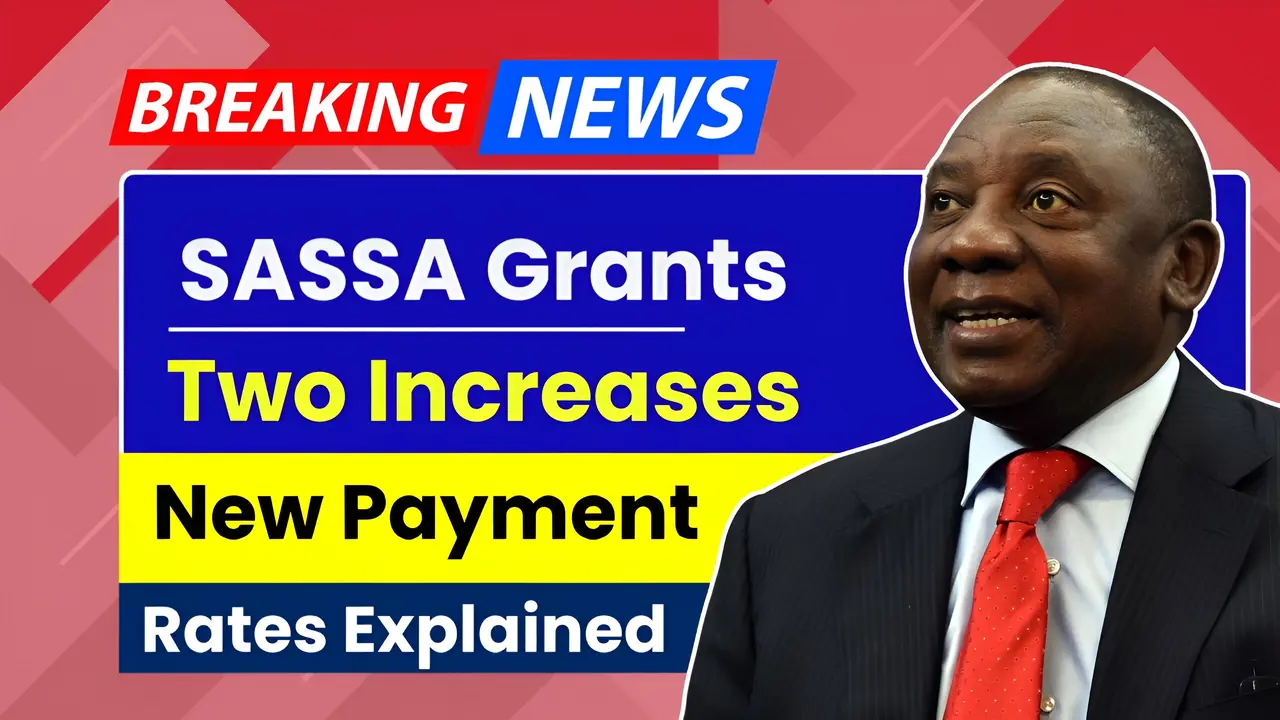The South African Social Security Agency (SASSA) plays a vital role in supporting millions of vulnerable citizens by providing financial assistance through social grants. These grants help pensioners, people with disabilities, caregivers, and other beneficiaries meet essential needs such as food, housing, and healthcare. For many, these grants are a crucial lifeline, especially in challenging economic conditions.
In 2024, SASSA introduced two modest increases in grant payments, aimed at offering some relief to beneficiaries facing financial strain. While the increases were small, they demonstrate the agency’s ongoing efforts to support vulnerable groups.
Breakdown of the 2024 Grant Increases
The table below summarizes the updated grant amounts following the two increases implemented in April and November 2024:
| Grant Type | Previous Amount (R) | New Amount (R) | Increase (R) |
|---|---|---|---|
| Old Age Pension (<75) | 2,180 | 2,190 | 10 |
| Old Age Pension (≥75) | 2,200 | 2,210 | 10 |
| Disability Grant | 2,180 | 2,190 | 10 |
| Care Dependency Grant | 2,180 | 2,190 | 10 |
| War Veterans Grant | 2,190 | 2,200 | 10 |
| Child Support Grant | 510 | 510 | 0 |
While the Child Support Grant remained unchanged for 2024, there are future plans for its adjustment.
Why Only R10?
The modest R10 increase in the grants has drawn mixed responses. Many beneficiaries have expressed concern that the adjustment does not sufficiently address the rising cost of living. However, SASSA explained that the small increase is due to budgetary constraints. Managing an annual social grant budget of R265 billion and supporting millions of beneficiaries nationwide makes even a modest increase a significant financial outlay. Despite the increase not being enough to cover all needs, it is seen as a step to ensure the sustainability of the system.
Focus on Key Beneficiaries
The 2024 increases have primarily targeted three groups that are most vulnerable to inflation and economic hardship:
- Elderly Individuals:
The Old Age Pension is a critical source of income for many senior citizens who lack retirement savings. The increase helps them manage basic expenses and improve their quality of life. - Persons with Disabilities:
The Disability Grant is essential for those who are unable to work due to physical or mental impairments. This adjustment offers support for medical needs and daily living expenses. - Caregivers of Disabled Children:
The Care Dependency Grant provides financial relief to caregivers of children with disabilities. The additional R10 helps families manage the extra costs involved in care.
Child Support Grant Future Adjustments
While the Child Support Grant remains at R510 in 2024, SASSA has announced plans for an increase in April 2025. This grant provides critical support to caregivers of children, many of whom face rising costs in food, education, and healthcare. The specifics of the upcoming increase have not been disclosed, but it is expected to offer much-needed relief.
Improved Payment Processes
SASSA has introduced various measures to streamline and improve the grant payment system, ensuring that beneficiaries can access their funds more easily and securely.
- Staggered Payment Schedules:
To reduce overcrowding at payment points, SASSA has implemented a staggered payment system. Grants will be distributed from the 2nd to the 4th of each month, with priority given to elderly and disabled beneficiaries. This system aims to create a more organized and less stressful payment experience. - Encouraging Bank Card Use:
SASSA is promoting the use of bank cards for grant withdrawals, offering several advantages:- Reduced Risk of Theft: Bank cards help minimize the risk of theft, as beneficiaries do not have to carry large amounts of cash.
- Convenience: Funds can be accessed at thousands of ATMs and retail outlets, reducing the need for long-distance travel.
- Flexibility: Beneficiaries can withdraw only the amount they need at a time, avoiding the need to carry or withdraw the full amount.
Addressing Challenges in Rural Areas
One of the ongoing challenges for SASSA is ensuring that beneficiaries in rural areas can easily access their grants. The closure of cash pay points has made it difficult for some people to reach payment locations, often resulting in high transportation costs. This is particularly burdensome for elderly and disabled beneficiaries.
SASSA is responding to these challenges by:
- Reopening Cash Pay Points: Considering the reopening of pay points in areas with no alternative options.
- Mobile Payment Units: Partnering with local stores and exploring mobile payment solutions to reduce travel needs.
- Improved Access: Working with community groups to identify gaps and provide more accessible services.
In the long term, SASSA plans to further improve services in rural areas by establishing permanent service points and enhancing transportation options.
Conclusion
The 2024 SASSA grant increases may have been modest, but they reflect the agency’s ongoing commitment to supporting vulnerable groups across South Africa. With additional efforts to improve payment processes and address challenges faced by rural beneficiaries, SASSA is working to ensure that its social grant system remains effective and sustainable for years to come. While future adjustments may be necessary, these changes provide a crucial safety net for millions of South Africans in need.



